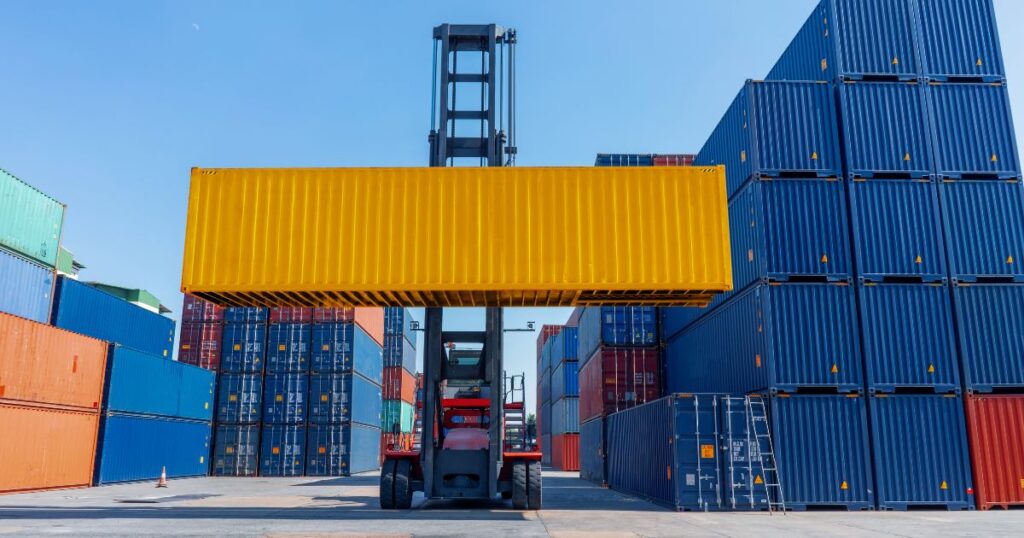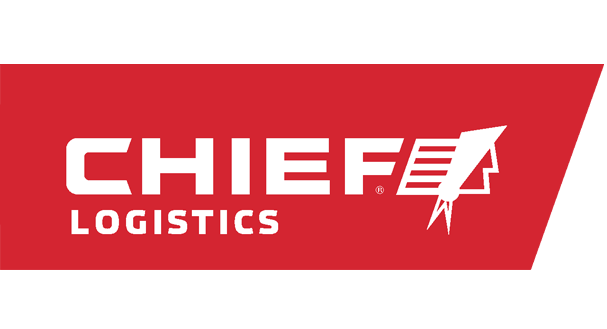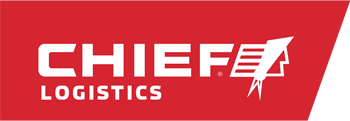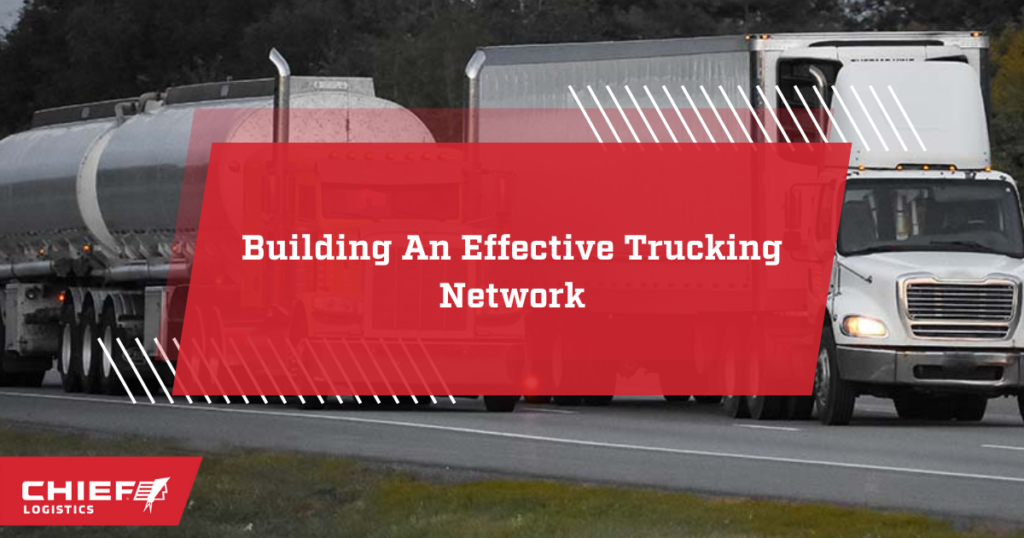Building a Trucking Network: Overcome Key Challenges
In logistics, establishing a resilient trucking network is vital for businesses looking to thrive. But the journey is filled with challenges.
From navigating fluctuating fuel prices to addressing the persistent shortage of drivers and unraveling regulatory complexities, building a strong trucking network requires overcoming obstacles.
At Chief Logistics, we’ve walked this road, intimately understanding the struggles and triumphs of building and maintaining a powerful trucking network.
Today, we share insights, strategies, and practical tips that have helped us create a better company through networking in this industry.

Understanding the Trucking Network of Freight and Logistics
The trucking industry plays a vital role in the economy by ensuring the seamless movement of goods from one place to another.
Having a strong trucking network is essential for efficient logistics operations and supply chain management.
Let’s explore the importance of a robust trucking network, the current challenges faced in the industry, and how these challenges impact the development of a resilient network.
Importance of a Strong Trucking Network
A strong trucking network is the backbone of efficient logistics operations. It involves a well-connected system of carriers, drivers, and routes that enable the timely delivery of goods to their destinations.
Current Challenges in the Trucking Industry
The trucking industry faces several challenges that impact the efficiency of network operations.
Driver shortages, fluctuating fuel prices, regulatory changes, and infrastructural limitations pose significant hurdles for carriers and shippers alike.
Impact of Challenges on Building a Robust Network
The challenges experienced in the trucking industry directly affect the development of a robust network.
Driver shortages can lead to capacity constraints and service disruptions, affecting delivery schedules and customer satisfaction.

Strategies for Overcoming Challenges in Freight and Logistics Market
Navigating the complexities of building a robust trucking network requires implementing strategic solutions that tackle various obstacles head-on.
Embracing advanced technology, enhancing driver recruitment and retention, optimizing route planning and fleet management, and addressing regulatory compliance are key strategies for overcoming challenges effectively.
By implementing these strategies, trucking companies can streamline operations, enhance efficiency, and build a resilient network that delivers exceptional service to customers.
Implementing Advanced Technology Solutions
Embracing advanced technology solutions is essential for streamlining operations and enhancing efficiency in a trucking network.
Utilizing telematics systems, GPS tracking, and real-time data analytics can provide valuable insights into fleet performance, driver behavior, and route optimization.
Enhancing Driver Recruitment and Retention
One of the critical challenges in the trucking industry is recruiting and retaining skilled drivers.
To address this, trucking companies can implement driver incentive programs, competitive compensation packages, and ongoing training opportunities.
Optimizing Route Planning and Fleet Management
Effective route planning and fleet management are essential for maximizing efficiency and reducing operational costs.
Utilizing route optimization software, companies can identify the most efficient routes, minimize empty miles, and reduce fuel consumption.
Addressing Regulatory Compliance
Navigating the complex landscape of regulatory compliance is a crucial aspect of building a strong trucking network.
Staying informed about industry regulations, safety standards, and compliance requirements is essential for avoiding penalties and ensuring operational continuity.

Building Strong Partnerships and Collaborations
Building a robust network in the trucking industry relies heavily on establishing strong partnerships and collaborations.
By forging relationships with reliable carriers and establishing trust with key stakeholders, companies can navigate the complexities of the logistics landscape more effectively.
Aligning with trustworthy partners with transparent communication is essential for driving mutual growth and success in the highly competitive field of trucking.
Forge Relationships with Reliable Carriers
In the highly competitive world of trucking, partnering with trustworthy carriers is crucial for the success of your transportation network.
When selecting carriers to work with, consider factors such as their safety record, on-time delivery performance, capacity availability, and overall reputation in the industry.
Establishing Trust with Key Stakeholders
Trust is the cornerstone of any successful collaboration. Transparent communication, reliability, and consistent performance are key elements in fostering trust within the logistics network.
USA Logistics Companies: Efficient Operations and Customer Satisfaction
In the trucking industry, ensuring efficient operations is paramount for delivering exceptional customer satisfaction.
Improving supply chain visibility and implementing continuous performance evaluation are two key strategies to achieve this goal.
By leveraging advanced technologies, optimizing routes, and regularly assessing key performance indicators, trucking companies can streamline operations, boost productivity, and enhance customer satisfaction levels.

Improving Supply Chain Visibility
Enhancing supply chain visibility involves tracking shipments in real time, monitoring inventory levels, and streamlining communication between all parties involved in the logistics process.
By leveraging advanced tracking technologies and data analytics, trucking companies can optimize routes, predict potential delays, and proactively address issues before they escalate.
Implementing Continuous Performance Evaluation
Continuous performance evaluation entails regularly assessing key performance indicators (KPIs) such as on-time deliveries, fuel efficiency, and driver behavior.
By establishing performance benchmarks and conducting ongoing evaluations, trucking companies can identify areas for improvement, recognize top-performing drivers, and implement targeted training programs to enhance overall operational efficiency.
Investing in Training and Skill Development
Investing in the training and skill development of employees is a crucial aspect of building a strong trucking network.
By empowering your workforce with continuous learning opportunities, you not only enhance their individual capabilities but also contribute to the overall growth and success of your company in the highly competitive trucking industry.
Empowering Employees with Ongoing Training Programs
Implementing ongoing training programs for your employees is key to staying ahead in the trucking industry. By providing regular training sessions, you equip your team with the knowledge and tools they need to navigate challenges effectively and deliver exceptional service to clients.
- Regular training programs help employees stay updated on industry trends and best practices.
- Addressing specific skill areas through targeted training can lead to improved performance and efficiency.
- Training sessions create a sense of camaraderie among team members, promoting collaboration and a shared commitment to excellence.
Creating a Culture of Learning and Improvement in Supply Chain Management
Creating a culture of learning and continuous improvement within your trucking company can have far-reaching benefits.
Encouraging employees to embrace new challenges, seek out learning opportunities, and share their knowledge with colleagues cultivates a dynamic and innovative work environment where everyone is committed to personal and professional growth.
- Promote a growth mindset among employees, encouraging them to see mistakes as opportunities for learning and development.
- Recognize and reward employees who actively engage in training and skill enhancement activities, reinforcing a culture that values continuous improvement.
- Provide resources and support for employees to pursue further education or certifications related to the trucking industry, helping them expand their expertise and advance their careers.
By prioritizing employee growth and fostering a culture of learning, you can build a resilient and competitive trucking network that thrives in the face of challenges.

Building an Effective Trucking Network
Building a strong and resilient trucking network is essential for businesses to thrive in the competitive logistics industry.
By implementing strategic solutions, embracing advanced technologies, committing to a partnership mindset, and investing in employee development, companies can overcome challenges and deliver exceptional customer service.
Creating a culture of continuous improvement and empowering employees with ongoing training opportunities are key to building a powerful trucking network that can navigate the complexities of the industry and drive long-term success.
Hire Logistic Companies with a Strong Trucking Network
At Chief Logistics, we’re committed to helping you navigate the complexities of the trucking industry and build a resilient, efficient network.
Our expertise, strategic insights, and innovative solutions can empower your business to overcome challenges and achieve long-term success.
Don’t let obstacles hinder your growth – partner with Chief Logistics today and unlock the full potential of your trucking network.
Contact us now to get started.









